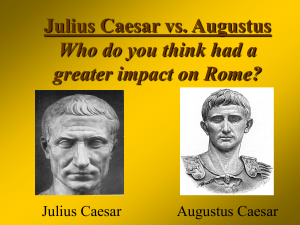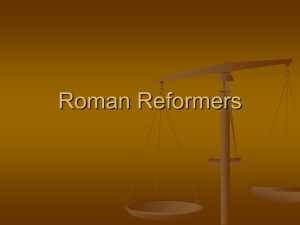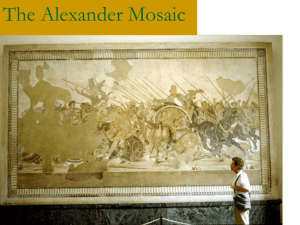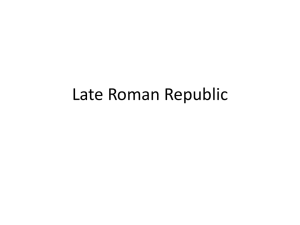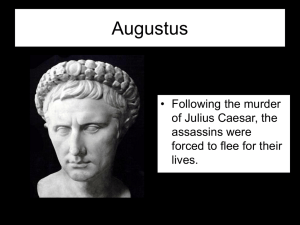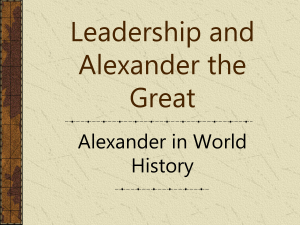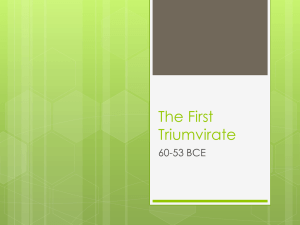Important Leaders in Ancient Greece and Rome
advertisement
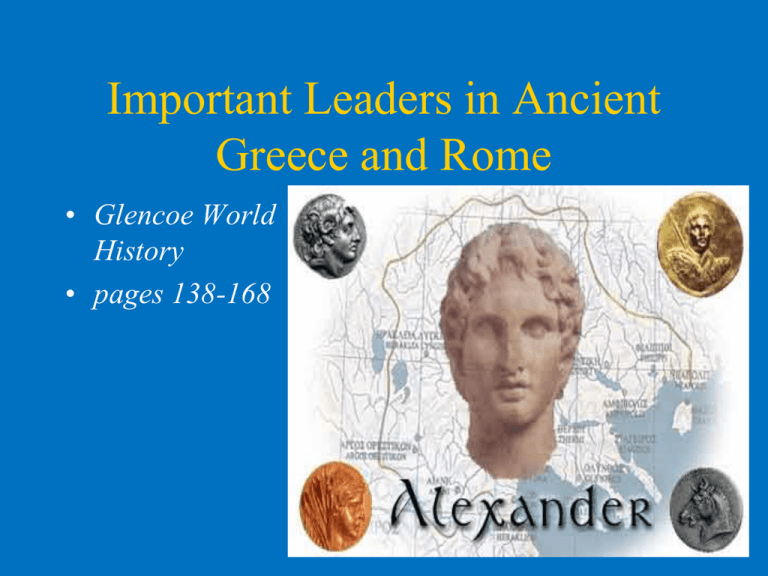
Important Leaders in Ancient Greece and Rome • Glencoe World History • pages 138-168 Standards • SSWH3 The student will examine the political, philosophical, and cultural interaction of Classical Mediterranean societies from 700 BCE to 400 CE. • b. Identify the ideas and impact of important individuals; include Socrates, Plato, and Aristotle and describe the diffusion of Greek culture by Aristotle’s pupil Alexander the Great and the impact of Julius and Augustus Caesar. Introduction • http://videos.howstuffworks.com/hsw/1217 3-ancient-civilizations-alexander-the-greatvideo.htm • http://www.brainpop.com/socialstudies/wor ldhistory/riseoftheromanempire/preview.we ml Alexander the Great • King of Macedonia who inherited control of Greece from his father, Philip II, who had conquered the region • Sought to fulfill his father’s dream of conquering the Persian Empire • Motivated by the desire for glory and empire but also by the desire to avenge the Persian burning of Athens Alexander’s Conquests • 334 BC Alexander entered Asia Minor with an army of 37,000 men, both Macedonians and Greeks • By 332 BC Syria, Palestine, and Egypt were under his control • Built Alexandria as the Greek capital of Egypt • 331 BC victory at Gaugamela gave Alexander possession of the Persian Empire Alexander’s Conquests • Over the next 3 years, Alexander moved east and northeast as far as modern Pakistan • In 326 BC he entered India, where his soldiers refused to go farther • On the return trip home thousands died from lack of water as they traveled through the desert of Southern Iran • Alexander returned to Babylon where he planned more campaigns but died there in June 323 BC, exhausted from wounds, fever, and too much alcohol The Legacy of Alexander • A great military leader; inspired his men • Extended Greek and Macedonian rule over a vast area • Stimulated the economies of Greece & Macedon • Created military monarchies • Due to his conquests, Greek language, architecture, literature and art spread throughout Southwest Asia and the Near East • The Greeks also absorbed aspects of Eastern culture From Republic to Empire • In 60 BC , three men Crassus, Pompey, and Julius Caesar formed the First Triumvirate. • A triumvirate is a government by three people with equal power. • After Crassus was killed in battle, civil war emerged between Pompey and Julius Caesar • Caesar was made dictator in 45 BC Julius Caesar’s Reforms • Gave land to the poor • Increased the Senate to 900 members • Increasing the numbers and filling it with his supporters, weakened the power of the Senate • Planned more building projects and military adventures but was executed in 44 BC Augustus Caesar • Age of Augustus- 31 BC to 14 AD • Octavian (Julius Caesar's heir and grandnephew) was his given name • Given the name Augustus in 27 BC • Given title Imperator, or commander in chief • The first Roman emperor Augustus Caesar • Maintained a standing army of 28 legions (about 150,000 men) • Stabilized the frontiers of the Roman Empire, conquering many new areas • Attempted to conquer Germany but failed
